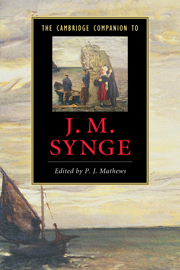Book contents
- Frontmatter
- Part 1 The Synge Texts
- 1 Re-thinking Synge
- 2 The Shadow of the Glen and Riders to the Sea
- 3 The Playboy of the Western World
- 4 The Well of the Saints and The Tinker’s Wedding
- 5 The Aran Islands and the travel essays
- 6 Deirdre of the Sorrows
- Part II Theorising Synge
- Part III Synge on stage
- Select bibliography
- Index
- Series List
1 - Re-thinking Synge
from Part 1 - The Synge Texts
Published online by Cambridge University Press: 28 March 2010
- Frontmatter
- Part 1 The Synge Texts
- 1 Re-thinking Synge
- 2 The Shadow of the Glen and Riders to the Sea
- 3 The Playboy of the Western World
- 4 The Well of the Saints and The Tinker’s Wedding
- 5 The Aran Islands and the travel essays
- 6 Deirdre of the Sorrows
- Part II Theorising Synge
- Part III Synge on stage
- Select bibliography
- Index
- Series List
Summary
John Millington Synge, widely regarded as the most influential Irish dramatist of the twentieth century, burst on to the scene in 1903 when his first play, The Shadow of the Glen, caused a stir among audiences and critics alike during its opening run in Dublin. Over the next two years Synge produced another two plays: Riders to the Sea (1904), which is considered to be one of the greatest one-act plays in the history of modern drama; and The Well of the Saints (1905) which celebrates the imagination and heroism of the dissident who refuses to be coerced into conformity at the behest of the moral majority. Synge may well have drawn on the lessons of the latter play when, in 1907, he became notorious as the author of The Playboy of the Western World, which caused riots in the Abbey Theatre and brought his work to the attention of the wider world for the first time. Two other plays, The Tinker's Wedding written in 1907 and Deirdre of the Sorrows staged posthumously in 1910, complete the canon of Synge's plays. Yet before his early death in 1909 he also left a small body of prose of considerable significance which includes The Aran Islands (1907) and an extraordinarily rich compendium of travel essays, now collected under the title In Wicklow, West Kerry and Connemara (CW II, 187-343), as well as a robust collection of poetry (1909). Despite the relatively small corpus of work he left behind, Synge's stature has continued to grow steadily among audiences, readers and critics since his early death over a century ago.
- Type
- Chapter
- Information
- The Cambridge Companion to J. M. Synge , pp. 3 - 14Publisher: Cambridge University PressPrint publication year: 2009
- 3
- Cited by

